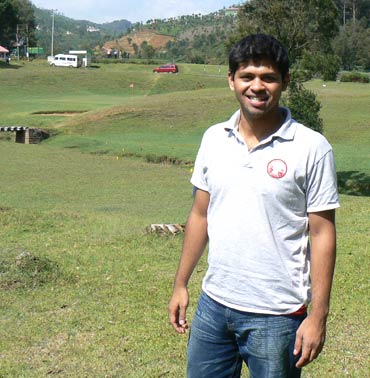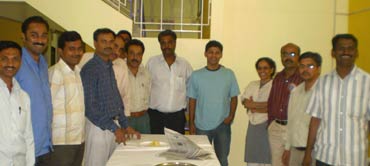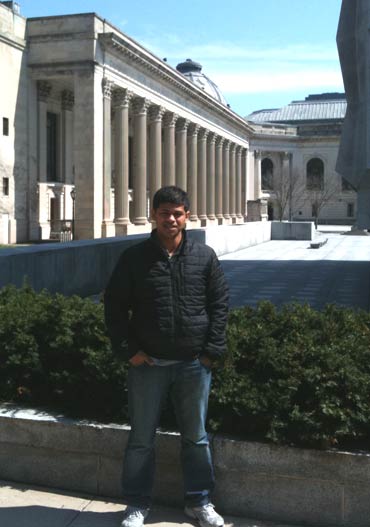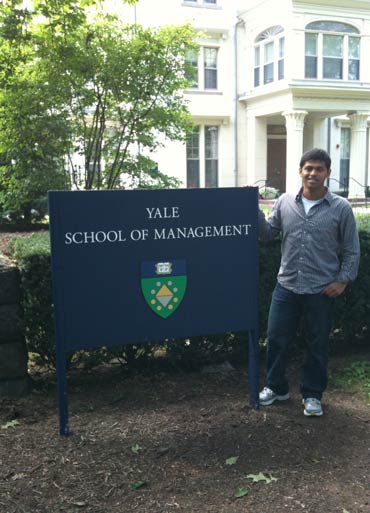
Ravikant Kalluri is currently enrolled at an MBA programme at Yale School of Management, USA. What sets Ravi apart from many other B-school students is the fact that he has taken a year off from his management studies to work in rural India.
A qualified software engineer, he joined Cognizant Technology Solutions in 2003 right after graduating and was with them till he quit as business analyst in 2008. He then joined Myrada, which is a rural development NGO in Bangalore.
"Challenging myself is a way of life for me," says Ravi. "In fact taking a step such as leaving my job at Cognizant seemed like jumping on a great learning opportunity rather than taking a big risk," he adds.
It is the same belief that drove him to take a leave of absence from his MBA programme at Yale (despite a substantial loan) to work on a business in rural Karnataka and an educational services company, GradMentors (gradmentors.com) based in Bangalore.
"Working in the villages of Chitradurga district (in rural Karnataka) was the greatest learning experience for me," says Ravi, who has started two community-owned businesses in Chitradurga. These businesses employ a total of 100 people and are completely owned by women from the villages.
It was while working for Myrada in the villages that he says made him consider an MBA at Yale. "Yale has a philosophy for developing leaders for business and society. It has great support for students interested in working with NGOs in terms of courses, resources and student activities," he adds.
"Try things that you are interested in, irrespective of the sacrifices and challenges and that's the best way to find your passion," says Ravi. This is how he discovered his desire for entrepreneurship and entrepreneurship development.
In an interview with rediff.com, the 28-year-old talks about his personal experiences, the two enterprises he is working on and his studies at Yale.
...

How did you apply to the programme?
I was interested in social entrepreneurship and, after doing some research on different business schools, Yale was my first choice. Yale lays a lot of emphasis on the impact its students and alumni want to create on business and society. It nurtures its students to not only think big but also encourages them to think about achieving greater impact through their work, be it in the world of business, government or through NGOs.
I was in Chitradurga when I was making the business school application. I had internet access only in the district office. I had to wait every day until everyone left for the day to gain access to the computer with an internet connection. I used to start at around 10 pm and work until early in the morning.
At times it was tiring as I had to travel at least 100 km in the villages during the day on my bike. Yet I knew that an MBA from Yale would be essential for me to make the kind of impact that I wanted to make. Although an MBA is not a prerequisite for entrepreneurship, but an MBA puts one on an accelerated learning curve.
Tell us about your experience of studying at one of the world's top colleges -- Yale.
The first thing that impressed me was the quality of people, not only in the MBA programme but across the university. In my second month there, while I was walking through the streets of New Haven, I saw noble laureate Dr R K Pachauri. I immediately walked up to him to talk and found out that he has an office right next where my MBA classes are held.
The first year was fun -- doing assignments and attending classes. The greatest learning, however, was from the interactions with classmates and the guest lecturers. We attended talks by former UK Prime Minister Tony Blair and the CEO of PepsiCo, Indra Nooyi among others.
Towards the end of the first year I presented a business plan to a set of high-profile investors at a business plan competition. It was then that I realised how valuable the Yale MBA is.
Tell us about the MBA programme.
I think the biggest differentiator is the way the first year core courses are structured. Called the 'Organizational perspective', these interdisciplinary courses are structured around the way business leaders work. Instead of designing the core courses as Marketing, Finance, Strategy etc, there are courses that are designed based on the way today's business leaders approach problems.
These courses cut across traditional business school courses and teach students how different business functions come together in a real business environment. So we had classes where the strategy professor and finance professor used to teach together. These cases were a real insight into solving real-life business problems.
Apart from the courses, the school has very active student clubs and every week there were talks by leaders from different industries.

You have taken a break from your studies to work on a venture to produce eco-friendly products in rural Karnataka. Tell us about that.
I could have taken up a regular job during my time off from business school. However, my true interest was in improving the quality of products made in rural India to market it to developed markets in the world. There is a great risk, as I also have to pay my student loans during this time. However, I see great potential in some of the products and believe I can launch a successful product.
Currently I am working on conducting market research and am in the final phase of buying machinery and identifying locations for the business. In fact I invite anyone interested in working or just learning more about the idea of producing high-quality products in rural India and selling it in the international markets to reach out to me.
My plan is to start a unit in the Chitradurga district, because that is where I have worked for Myrada, and there are many people from the villages who are also interested in the business.
In 2008, I had started two community-owned businesses in Chitradurga. These businesses are providing sustainable employment opportunities for the people in the villages. Setting up another business in Chitradurga, will also give me an opportunity to help these other businesses scale up and employ more people.
Tell us about working with Myrada in Chitradurga?
After working in the air-conditioned offices of Cognizant, it was a big change to live and work in the villages. I took some time to adjust and the going was tough in the beginning. Add to that the fact that I didn't know the local language that well, I would say during the initial days my decision to move to Chitradurga was really put to the test.
What kept me going was the hard work and dedication of my colleagues in Chitradurga. In the end, the learning and the impact I was able to achieve was something that made it all worth it.
You have also started an educational services company called GradMentors. What does GradMentors do?
When I was applying to B-school I would surf online discussion forums for help on choosing the right programme for me. Writing the essays was the easiest part, once I had decided on the programme I wanted to apply to. However, it took me a lot of time to do this research. It was from this experience that I realised that there was need for a quality advisory service for students interested in applying to business schools.
So, I started GradMentors that provides such a service to MBA aspirants. I concentrate on providing advisory services, where I work with candidates to guide them into doing the right research through websites, current students and alumni of different schools to help them choose the right school based on their profile, post-MBA career aspirations and other preferences.
This is a research-driven approach where students take control of the process and increase their chances of getting admitted to the best business school based on their interests and not just any business school. I also advise them on the best strategy to present their stories in the essays for the application. However, I do not write the essays for them.
GradMentors also has a special programme for those who want to apply to business schools in the future but want to start preparing early. I encourage students to consider their goals and also help them in improving their profiles to have a better chance of getting admitted to top business schools. Later, when they are ready to apply to the programmes of their choice, I help them with the application process as well.
Apart from this we conduct training programmes for engineering and business school students.

What are the other activities that you are involved in?
I have been involved with NGOs like CRY and some other Bangalore-based NGOs since my engineering days. Working with the NGOs was a hobby that used to keep me busy most weekends.
Once I joined the NGO sector full-time, there was a void during my free time that I still haven't been able to fill. I do enjoy an occasional run, going out with friends and travelling. In the last 2 months alone I have travelled 10,000 kms on my car.
Apart from that, I love movies and have even directed a short 1-minute film and worked on a film set as a production assistant.
What is your inspiration, what keeps you going?
I have always drawn inspiration from people around me. I have also been lucky to be around people who always inspire me. From my parents I learnt perseverance and hard work. At Cognizant my manager was Pushparaj Hilarian, who is a great leader and has taught me lot of finer aspects of leadership.
At Myrada, my manager Latha Mala and most of the other employees have been helping people in rural India for longer than a decade and are always a source of inspiration. At Yale I learnt a lot from the guest speakers who loved their work and provided many insights that still drive me.
Your advice to other entrepreneurs...
I am from a middle-class family and there were times when I had to dig deep into my pockets to do what I wanted. But, end of the day, when you see the impact of your work, all the sacrifices seem worth it.
I have only one principle -- Just Do it. Of course there needs to be a lot of planning until the rubber meets the road, but excessive planning without much action can act as an impediment. One has to be willing to take risks and persevere especially during times when the future isn't very clear.
My advice to other entrepreneurs would be that if there is an activity that you are interested in or a business idea that you think has great potential, then just start doing it today.